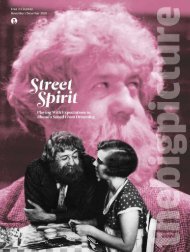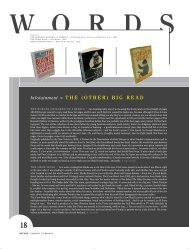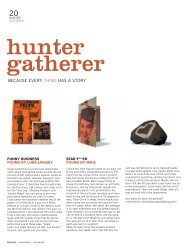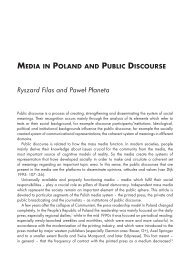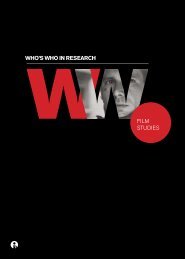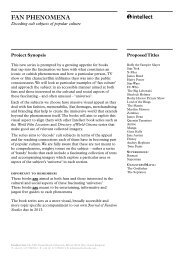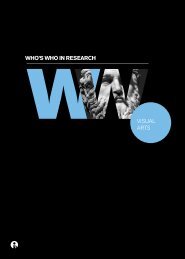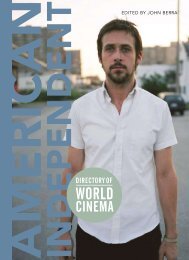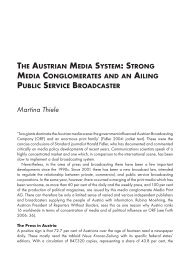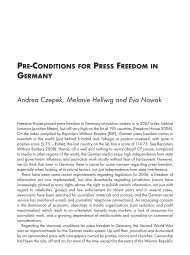Anthem - Intellect
Anthem - Intellect
Anthem - Intellect
Create successful ePaper yourself
Turn your PDF publications into a flip-book with our unique Google optimized e-Paper software.
<strong>Anthem</strong><br />
Until that moment, only West European entries (Belgium, France, Ireland, Italy and<br />
Spain) had presented songs with an explicit focus on Europe. Here, Baltic Lithuania<br />
made a very clear statement that somehow repeats the Schuman Declaration idea<br />
of rising from war disasters to glory, but transposed onto the post-Communist<br />
experience and adding an East–West tension to the equation. This had almost two<br />
millennia old roots back in the division of the Christianised Roman Empire into a<br />
western and an eastern half. InCulto’s song made explicit the mutual distrust that has<br />
surfaced both on the general political level and within the ESC, where there has since<br />
the early 1990s been a recurrent debate on how to balance the taste structures of East<br />
and West Europe, that came to disturb the already precarious balance between north<br />
and south European preferences.<br />
Other songs outside the ESC and from other genres of popular music than<br />
mainstream pop add shifting flavours to the identification of Europe. Some join the<br />
ESC chorus by giving a positive image of Europe’s historical richness and beauty, often<br />
with a kind of nostalgic memories of experiencing inter-European encounters.<br />
German electronic band Kraftwerk’s ‘Trans-Europe Express’ and ‘Europe Endless’<br />
were released on the group’s album Trans-Europe Express (1977), with one complete<br />
version in English and another in German. The imagery of transcontinental trains<br />
revives futurist and modernist themes of the 1920s’ avant-garde. Typical for Kraftwerk,<br />
both these songs have minimalistic lyrics, with short catch phrases endlessly repeated.<br />
Repetitions excluded, the complete lyrics of ‘Europe Endless’ is thus: ‘Life is timeless /<br />
Europe endless […] / Parks, hotels and palaces […] / Promenades and avenues […] /<br />
Real life and postcard views […] / Elegance and decadence […]’. The central element<br />
of urban civilisation links to the theme of aristocratic elevation, while the initial and<br />
concluding combinatory pairs are highly ambivalent: eternity and repetition, reality and<br />
image, elegance and decadence. The resulting meaning is deliberately evasive, except<br />
for the linkage of Europe to classical aristocratic city culture that is problematised by<br />
the synthetic and repetitive sound structure, transforming infinite grandiosity into<br />
almost unbearable boredom. ‘This song makes me feel good about being a European’,<br />
writes a fan on a website for interpreting songs, but is contradicted by another: ‘This<br />
song is not an ardent ode to Europe. Life is not timeless and Europe is certainly not<br />
endless, that’s the point.’ 437 In a way, the two do not directly contradict each other, and<br />
both readings may well be challenged, as the song’s evaluation of Europeanness is far<br />
from unequivocal and it is hard to say if timelessness is in this case good or bad.<br />
The same album’s lead song had a similar structure: ‘Trans-Europe Express […]<br />
/ Rendezvous on Champs-Elysees / Leave Paris in the morning on T.E.E. […] / In<br />
Vienna we sit in a late-night café / Straight connection, T.E.E. […] / From station to<br />
station / back to Düsseldorf City / Meet Iggy Pop and David Bowie’. ‘Station to station’<br />
is an intertextual reference to Bowie’s song and album from 1976, and to his and Iggy<br />
Pop’s collaboration in Berlin, where they were influenced by Kraftwerk’s experimental<br />
195



